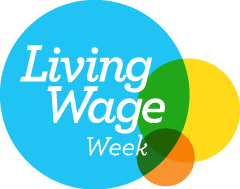Sara Llewellin welcomes Living Wage Week as an opportunity to promote Living Wage’s potential for tackling in-work poverty
This week is Living Wage Week. The Living Wage Campaign calls for every waged person in the country to earn enough to provide their family with the essentials of life. The Living Wage hourly rate is calculated according to the cost of living and set independently every year. Launched by Citizens UK in 2001, the campaign so far has been responsible for generating £210 million of additional wages, lifting more than 40,000 families out of in-work poverty.
The new Living Wage rates for 2015 have been announced today. In London the rate is now £9.15 an hour – a rise of 4% from £8.80 per hour. Outside London the UK Living Wage rate has been set at £7.85 per hour – an increase of 2.6% on the 2013 rate and 21% higher than the national minimum wage of £6.50 per hour – improving the take home pay of low-paid workers across the country who are employed by over 1,000 Living Wage accredited organisations.
The Living Wage Foundation, which accredits companies and organisations as Living Wage employers, can count companies such as Barclays, KPMG, Aviva, Nationwide, HSBC, Legal & General, as well as Oxfam, Save the Children, the TUC and Transport for London, in its ranks. Of course there are still a majority of large corporations and companies who do not pay the basic Living Wage to their workers, or ensure that the supply chain companies and providers they work with – cleaning staff, caterers, security firms etc. – pay a Living Wage.
For Barrow Cadbury Trust, with our long history of supporting equality issues and gender disadvantage (a majority of the low paid are women), not to mention the rights of migrant workers – many of whom will be on low wages, it went without saying that we would apply for Living Wage accreditation ourselves. This proved tricky, however, because our cleaners are not direct employees. Eventually we were able to negotiate to pay them at the London Living Wage rate, after taking advice from the Living Wage Foundation. So now we have our accreditation! Our next task is to persuade the other tenants in the building we occupy that they should commit to Living Wages and to speak to all the companies in our supply chain to find out if they are Living Wage employers.
As a foundation we see engaging with our grantholders and prospective applicants on the importance of building a Living Wage workforce as crucial. But we understand that it is not an easy thing to do, even if it is something we should all be working towards. Keeping the pressure up and our foot on the accelerator is essential. Despite more than a thousand employers signed up to the Living Wage we cannot afford to rest on our laurels.
The Trust will be working with other funders interested in supporting the Living Wage to develop and share good practice on being a Living Wage funder and employer, as well as supporting grantholders such as Citizens UK and Share Action – the latter working to influence and raise awareness amongst shareholders.
The research to back up the benefits of the Living Wage is all there. The report funded by Trust for London in October 2012 on the Costs and benefits of the London Living Wage is one. The Resolution Foundation has also published a report Beyond the Bottom Line: the challenges and opportunities of a Living Wage. And if you go to the Living Wage Foundation website you can read some personal accounts of just how peoples’ lives have benefitted from the Living Wage.
Sara Llewellin is the Chief Executive of Barrow Cadbury Trust.

